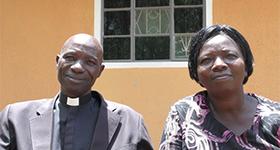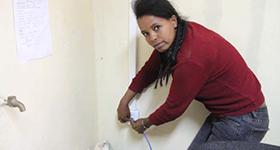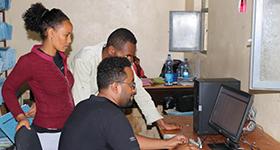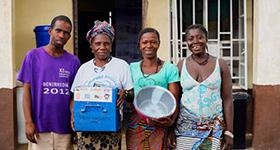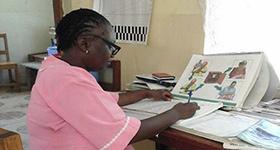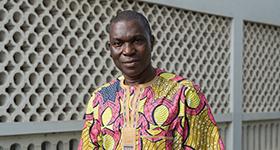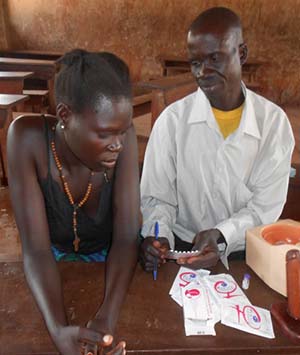
Phillip Anguzu, a trained CORP, counsels a community member on FP methods.
Background
Odoi Parish (in Rigbo Subcounty) is a hard-to-reach rural community along the Nile River in Arua District, West Nile Region, Uganda. This community is mainly engaged in fishing. The health status is very poor, health services are very far and uptake of services remains very low compared to district and national indicators. The total demand for family planning (FP) services in this region is 57.5 percent, and only 25 percent of this demand is currently satisfied.
Intervention
WellShare International is implementing a two-year project (Arua District Partnership for FP and HIV Integration) awarded by the Advancing Partners & Communities Program through USAID. In July and August 2014, WellShare trained 50 Community-Owned Resource Persons (CORPs)—volunteers already working to provide HIV prevention education and referrals to key populations including sex workers, youth, fishermen, transport workers and married couples—in community-based FP. One of the innovative activities the CORPs conduct along with health workers is integrating FP into HIV counseling and testing (HCT) outreaches in hard-to-reach areas in 10 subcounties of Arua District.
Through partnership with local government and lower health centers, WellShare is offering community-based HCT services through outreaches and is integrating FP alongside other services like elimination of mother-to-child transmission of HIV, screening for cervical cancer, antenatal care, referrals for complicated/advanced cases, and treatment for minor illness.
Outcomes
The integrated outreaches have enabled WellShare to reach the most vulnerable rural women and men with integrated messages and services on FP, HIV and AIDS, and other health-related information. The Rigbo community has come in large numbers to outreach sessions, with requests for more similar outreaches.
A few community leaders have actively enhanced the position of FP in their communities and helped mobilize local resources. They have organized community forums and invited FP providers and trained village health teams/CORPs to discuss the benefits of FP. They also serve as models and “champions” for FP by practicing FP and supporting CORPs to reach more people with FP information and counseling in the community.
“…I’m very grateful for this approach of WellShare and the health worker coming to us here instead of us going to them with this integrated HIV/AIDs & FP outreaches. We only used to see health workers coming to our place once in a while for immunization, but they would not even give us these other services… If there were no outreaches I wouldn’t know that even HIV-positive women can use family planning methods like pills, Depo [-Provera], implants and others. I have always feared to seek for FP services because my colleagues laughed at me because I am HIV positive.”
—Sabina, Community Member.
Lessons Learned
Distance and cost hinder access to FP services and helps explain why unmet need for FP among currently married women, ages 15–49, was at 42.9 percent in the West Nile region (before the project), significantly higher than the national average of 34 percent.
Community-based FP is helping men accept use of FP by their wives. Many rural communities did not know that condoms can be used for both HIV prevention and FP.
Additional effort is needed to scale up the intervention and strengthen behavior change communication to demystify some of the prevailing myths in these communities. Interventions should look at possibilities of working closely with cultural and religious institutions and local government.
Integration of FP into HCT outreaches provides an opportunity to reach large numbers of people with FP information and link them with the CORP who is working in their area for further counseling, method provision, and referrals. Integration also provides an entry point for offering FP information and services to those at risk of HIV and people living with HIV.

